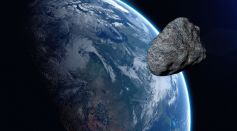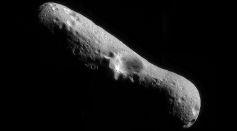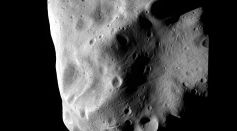Tags: Asteroid
Carbon-Rich Water Discovered in Ancient Meteorite Provides Clues to Solar System's History
Meteor Seen Above Florida: Did It Light up the Skies? [WATCH]
NASA’s Psyche Mission Achieves Key Milestone With Arrival of Key Component
Largest Near-Earth Asteroid to Make Its Closest Approach This Weekend, But We Should Not Worry

NASA Says Biggest Asteroid Will Pass By Earth With 77,000mph Speed; Here's How to Watch This Rare Moment
Oldest Crater of the World Isn't a Meteorite Crash Site, Here's What Geological Study Reveal
Dinosaurs Could Have Flourished Today Were It Not for Asteroids, Study Claims
NASA's OSIRIS-REx Successfully Touches Asteroid Bennu's Surface
The OSIRIS-REx Spacecraft is Getting Ready to Land on Asteroid Bennu

Neil DeGrasse Tyson: Refrigerator-Sized Asteroid Could Hit Earth Soon
NASA Set to Land on Bennu, Could Find New Clues on the Start of Life
NASA Expert Believes New "Asteroid" is a Discarded Rocket Part
73-Billion-Kilogram Asteroid Likely to Explode as It Continues to Spin at Increasing Speeds

Asteroid Bigger Than Great Pyramid of Giza May Pass Earth Next Week

An Asteroid Is Moving Towards Earth on Election Day Eve
Tether Assisted System Could Protect Earth From Asteroids, a Study That Used Computer Simulation Suggests
1,100 Foot Asteroid Will Speed Past Earth on Saturday, It's As Big As the Gillette Stadium!
Asteroid's Flyby Shows Earth's Planetary Defense In Action
Most Explosive Meteor Impact: 1908 Tunguska Explosion Caused by Iron Asteroid That Entered Earth Then Bounced Back to Space
NASA to Perform Checkpoint Rehearsal as OSIRIS-Rex Spacecraft will Touch Base at Bennu for Asteroid Sampling
Most Popular

10 Weird Things the Human Body Does—and the Science Behind These Biological Mysteries

Top Space Technology Trends and Aerospace Innovations Revolutionizing the World Today

Why Mega Typhoons Keep Getting Stronger: The Science Behind Typhoon Formation and Extreme Weather

How Plate Tectonics Trigger Earth's Most Dangerous Disasters Through Powerful Seismic Hazards





